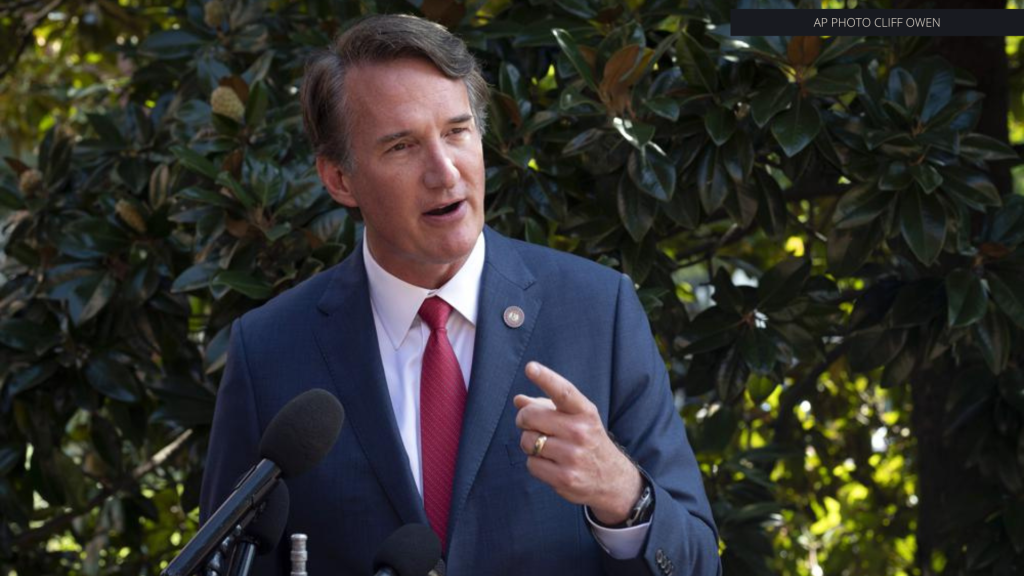RICHMOND, Va. (AP) — Republican Gov. Glenn Youngkin called Monday for expanding nuclear power generation in Virginia, reevaluating a recent clean energy law celebrated by environmentalists, and restoring greater authority to state regulators who oversee the state’s powerful utilities.
His administration laid out those and other goals in a 29-page state energy plan unveiled Monday morning before a crowd of elected officials and hard-hat-wearing workers at a power transformer manufacturing company in Lynchburg.
The energy plan, an exercise required by state law, carries no force but offers insight on policy choices Youngkin’s administration may pursue during future legislative sessions or through other means, such as executive action.
“The only way to confidently move towards a reliable, affordable and clean energy future is to go all in — all in — on innovation, and not abandon prematurely the reliable network that we currently have in place,” Youngkin said at the event. “I mean, think through this: innovation in nuclear, in carbon capture, in hydrogen, along with building on our leadership in offshore wind and solar. They all should be part of the solution.”
Virginia, in recent years when the state government was under full Democratic control, implemented a series of energy and environmental policy reforms intended to address the threat of climate change by reducing carbon emissions in the power and transportation sectors. The state moved toward adopting California’s strict vehicle emissions standards, joined a multistate carbon cap-and-trade program and in 2020 implemented a major green energy mandate that sets out a path toward 100% renewable generation.
Youngkin has made the case that many of those reforms go too far or will put an undue burden on consumers. He is already seeking to leave the carbon cap-and-trade program and decouple Virginia from California’s emissions standards. And while the plan doesn’t call for a full repeal of the Virginia Clean Economy Act, it says the law should be “reevaluated” and reauthorized in the next legislative session, and every five years thereafter.
Environmental groups and some Democratic state lawmakers were broadly critical of Youngkin’s agenda and vowed Monday to push back against attempts to undo the recent reforms.
“This ‘all-of-the-above’ energy plan is really just a thinly veiled attempt to obstruct our transition to a clean energy economy and roll back the climate action policies that are securing cleaner air for Virginia while creating jobs and investment in our state,” Michael Town, executive director of the Virginia League of Conservation Voters, said in a statement.
Town said his group would work with the Democrat-controlled Senate to block Youngkin’s administration “every step of the way as they work to undermine our progress.”
The Youngkin plan calls for the expansion of nuclear energy, including the goal of deploying a small modular reactor, or SMR, in southwest Virginia within 10 years and creating a nuclear energy research hub. SMR proponents say they could provide a cheaper, more efficient alternative to older mega-plants, though critics point to the risks and overall high cost of nuclear power projects.
The plan also says state agencies should “expedite approval of critical infrastructure projects,” noting the administration’s support for the in-progress Mountain Valley and other natural gas pipelines.
The plan does not explicitly mention climate change, an issue Youngkin largely avoided on the campaign trail last year.
“I think that climate change is a threat,” Youngkin, who is increasingly viewed as a possible contender for national political office, said in an interview with The Associated Press ahead of the plan’s rollout. “I believe we are seeing climate change.”
He said the clean energy goals of the previous plan, crafted under Democratic Gov. Ralph Northam, were laudable but overly rigid.
Regarding regulation, Youngkin’s plan says lawmakers have “increasingly diluted” the power of the State Corporation Commission. It calls for a return to biennial SCC rate reviews for the state’s largest electric utilities. It also calls for expanding the resources for the Attorney General’s Consumer Counsel Section, which represents the interests of ratepayers before the commission.
Democratic Del. Sally Hudson, a rate-reform advocate, tweeted that while she had reservations about parts of the plan, Youngkin was “calling on Virginia to reject the false choice between energy that’s affordable, reliable, & clean.”
Dominion Energy has backed much of the recent legislation that has restrained the commission’s oversight. Craig Carper, a spokesperson for the company, said it looks forward to “reviewing the plan in more detail and working with the administration and other policymakers to continue our long record of providing our customers reliable, affordable and clean electricity as well as economic development.”
A spokesperson for Appalachian Power, Teresa Hall, said it likewise was assessing the plan and any impacts to the company’s operations.
The plan also urges several steps to give customers more choice in where they source their electricity.
Youngkin said that’s something he thinks should apply to both “moms and dads in their own home” who might want to install solar, to “all the way through to independent power producers.”

Copyright 2022 by the Associated Press. All Rights Reserved.
Tune in live for more on the stories that matter to you: WMAL.com | WMAL app | “Alexa, play W-M-A-L”
Follow WMAL on social media: Twitter, Facebook, Instagram, Youtube, Rumble, Gettr and Parler




















